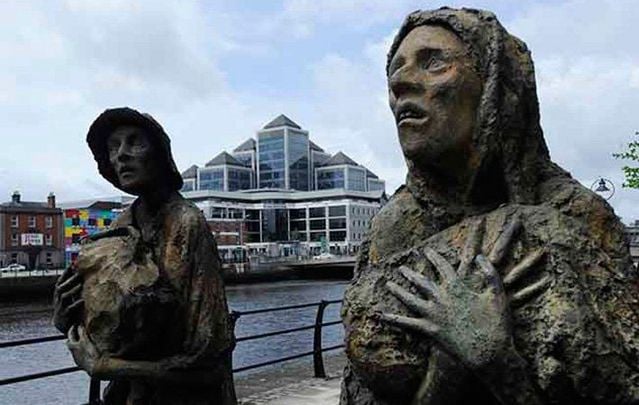Does Tim Pat Coogan have the evidence to show that the Great Hunger was an act of genocide, a result of English racism?
With "Black 47" set for a U.S. release on September 28, this will be the first time we'll see the Irish famine portrayed on the big screen despite a large range of books on the subject. One, in particular, may prove an important part of the true cause of the Great Hunger.
The most significant section of Tim Pat Coogan’s book on the Irish Famine is not his own writing, but his printing of the United Nations definition of genocide.
“The Famine Plot,” published by Palgrave MacMillan, was released in America in 2012 and Coogan should have been here to launch it that November, but in a separate and equally confounding plot, he was denied a visa to come here by the American Embassy in Dublin.
The conclusion from his book, however, is unmistakable.
Ireland’s most prominent historian, who has previously created definitive portraits of both Michael Collins and Eamon De Valera, has now pointed the finger squarely at the British during the Famine and stated it was genocide.
Tim Pat Coogan has painstakingly outlined the disregard shown to the Irish
It is a big charge, but Coogan is a big man, physically, intellectually, and in every sense. This makes it a very effective accusation. Coogan has painted a portrait of devastating neglect, abuse, and mismanagement that certainly fits the genocide concept.
I mean, if we go back to that time, Ireland was the equivalent of Puerto Rico or Samoa, massive dependencies on the United States today.
If there was a massive food shortage in either of those two countries, we would hope that the US would step up to the plate, literally, although President Trump's response in the wake of Hurricane Maria in 2017 was far from upstanding, claiming that the island was to blame for its ongoing humanitarian crisis following the natural disaster.
Why did Scotland not suffer famine to the same extent as Ireland?
Back in Famine time, the same potato crop disease occurred most heavily outside Ireland in Scotland, yet there were relatively few casualties as the landowners and government ensured, for their own sakes as much as anything, that there was no mass death.
That was not the case in Ireland, where a very different mentality prevailed. The damned Irish were going to get what they deserved because of their attachment to Catholicism and Irish ways when they were refusing to toe the British line.
As Coogan painstakingly recounts, every possible effort by local organizations to feed the starving was thwarted and frustrated by a British government intent on teaching the Irish a lesson and forcing market forces on them.
And Charles Trevelyan was the worst of them all
Charles Trevelyan, the key figure in the British government, had foreshadowed the deadly policy in a letter to the “Morning Post” after a trip to Ireland, where he heartily agreed with the sentiment that there were at least a million or two people too many in the benighted land and that the eight million could not possibly survive there.
“Protestant and Catholic will freely fall and the land will be for the survivors.”
Shortly after, he was in charge of a policy that brought that situation about.
One Trevelyan story and one quote suffice: “British Coastguard Inspector-General, Sir James Dombrain, when he saw starving paupers, ordered his subordinates to give free food handouts. For his attempts to feed the starving, Dombrain was publicly rebuked by Trevelyan…”
The Trevelyan quote is, “The real evil with which we have to contend is not the physical evil of the Famine but the moral evil of the selfish, perverse and turbulent character of the people.”
Tim Pat Coogan has done an enormous service with this book.
Read it and weep.
Do you believe that the Great Irish Hunger was genocide committed by the British? Leave us your thoughts in the comments section, below.
*Originally published in 2012.




Comments